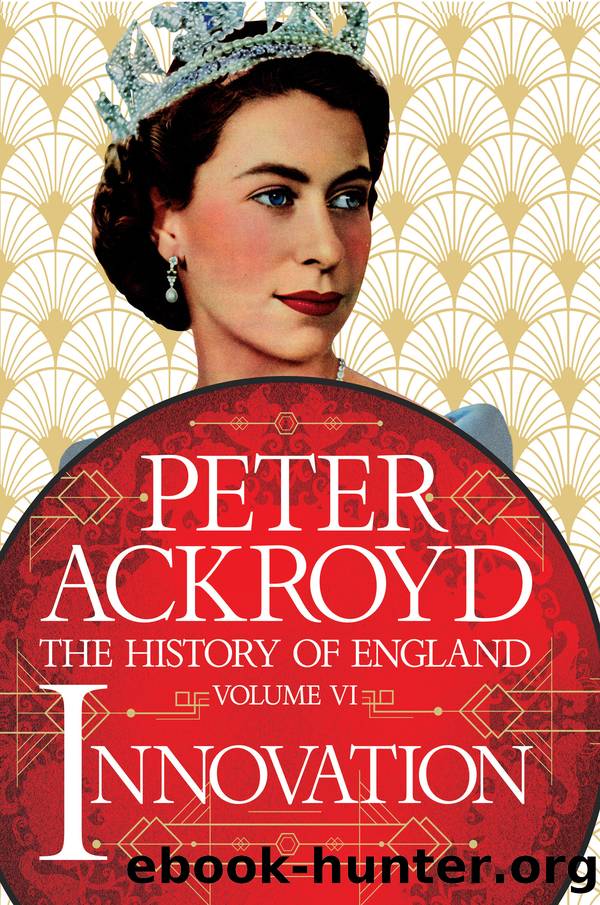Innovation: The History of England, Volume VI by Peter Ackroyd

Author:Peter Ackroyd [Ackroyd, Peter]
Language: eng
Format: epub
Publisher: St. Martin's Publishing Group
Published: 2021-08-24T00:00:00+00:00
33
The cruel real world
This was a time for even more privation. Bread rationing was reintroduced in the summer of 1946, and the cloud of a new terror occluded the sun with the threat of atomic war. It may seem odd that people can prevail under such circumstances, but patience and resignation had become customary. After constant attacks in the press, the prime minister, Attlee, felt obliged to reassure the nation that âmany of these restrictions fall heavily on the housewife. You can be assured that the Government will ease them as soon as it is possible to do so . . . On the question of bread rationing, your knowledge and good sense was an important factor in steadying and educating public opinion in the face of the press campaign last summer.â
The late 1940s inaugurated what may be termed the âhousewivesâ warâ, which was in part a war against the political classes. That the burden of increasingly restrictive rationing fell heaviest upon housewives was a fact denied by none, but while Conservative women aimed their darts at the government, women loyal to Labour reserved their wrath for the opposition. It was an unglamorous affair, and there were no clear or certain victors beyond the pale of Westminster and Whitehall.
The measures were provoked by a dollar economy, and by huge food import cuts. There was a further reduction in the clothes ration, and the use of foreign currency for pleasure travel was suspended. Hugh Dalton was forced to resign after he inadvertently supplied a journalist with details of the 1947 budget. He was perhaps the first victim of what became known as the press âleakâ. Stafford Cripps was now chancellor, and seemed quietly intent on spreading his own brand of punitively abstract philanthropy. But, like Churchill himself, he led by example. A proud Spartan, he demanded nothing of others that he was not prepared to do himself.
As the 1940s progressed and a new election came closer, political rhetoric rose both in heat and in shrillness. âWeâre up against itâ, âWe work or wantâ, âA challenge to British gritâ â such appeals were characteristic of the Labour approach. They would have had a certain resonance only a few years before, but many were now beginning to wonder why wartime appeals were being made in a time of peace. As ever, the press was divided. Where the Labour-supporting papers emphasized that the cuts were inevitable, their Conservative counterparts scoffed at what they saw as excuses for simple mismanagement.
While it was generally agreed that wartime rationing had introduced a diet that was far healthier than before, by the late 1940s the case was not so clear. The suggestion that rationing had begun to badly affect the nationâs basic health was first raised in May 1947 by Dr Franklin Bicknell in his paper âDying Englandâ. Speaking for the government, Michael Foot proclaimed that on average children were âstronger . . . than any breed . . . we have ever bred in this country beforeâ. It is true that not even the Conservatives went so far as to say that the nation was starving.
Download
This site does not store any files on its server. We only index and link to content provided by other sites. Please contact the content providers to delete copyright contents if any and email us, we'll remove relevant links or contents immediately.
| General | Channel Islands |
| England | Northern Ireland |
| Scotland | Wales |
Room 212 by Kate Stewart(5127)
The Crown by Robert Lacey(4817)
Endurance: Shackleton's Incredible Voyage by Alfred Lansing(4785)
The Iron Duke by The Iron Duke(4360)
The Rape of Nanking by Iris Chang(4216)
Joan of Arc by Mary Gordon(4115)
Killing England by Bill O'Reilly(4005)
Say Nothing by Patrick Radden Keefe(3988)
I'll Give You the Sun by Jandy Nelson(3448)
Shadow of Night by Deborah Harkness(3370)
Hitler's Monsters by Eric Kurlander(3343)
Mary, Queen of Scots, and the Murder of Lord Darnley by Alison Weir(3210)
Blood and Sand by Alex Von Tunzelmann(3205)
Eleanor & Park by Rainbow Rowell(3178)
Darkest Hour by Anthony McCarten(3133)
Margaret Thatcher: The Autobiography by Thatcher Margaret(3083)
Book of Life by Deborah Harkness(2939)
Red Famine: Stalin's War on Ukraine by Anne Applebaum(2935)
The One Memory of Flora Banks by Emily Barr(2864)
